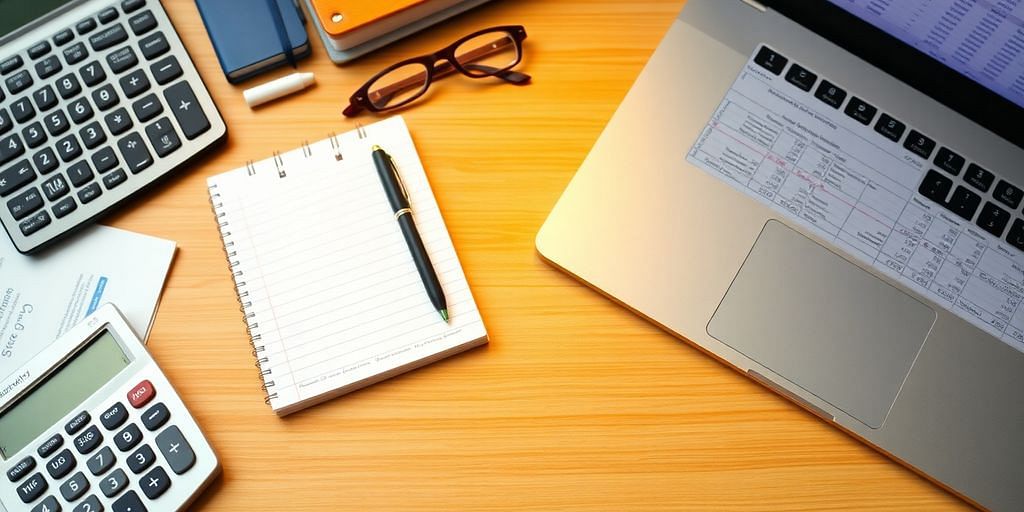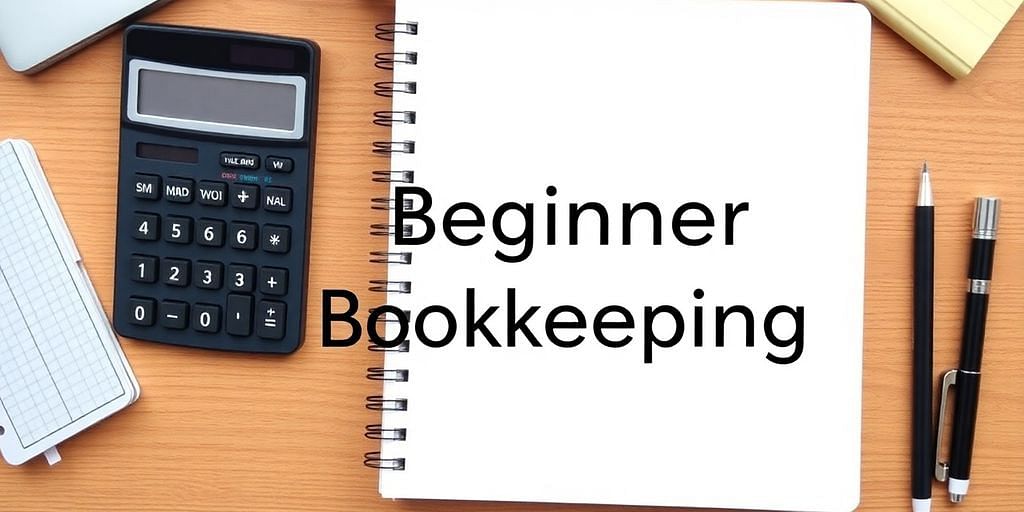
Learn How to Do Bookkeeping: A Step-by-Step Guide for Beginners
Back To BlogGetting Started With Bookkeeping Basics

Okay, so you're ready to dive into bookkeeping? Awesome! It might seem intimidating at first, but trust us, it's totally manageable. We're going to break down the basics to get you started on the right foot. Think of this as your bookkeeping boot camp – we'll cover the essentials and get you ready to tackle your finances like a pro.
Understanding the Difference Between Bookkeeping and Accounting
Bookkeeping and accounting? People often use these terms interchangeably, but they're not quite the same thing. Bookkeeping is more about the day-to-day recording of financial transactions. Think of it as the data entry part of the process. We're talking about tracking every dollar that comes in and goes out. Accounting, on the other hand, takes that raw data and turns it into something meaningful. Accountants analyze the data, prepare financial statements, and help you make informed business decisions. So, bookkeeping is the foundation, and accounting builds on top of it. It's like building a house – you need a solid foundation before you can start framing the walls. Understanding bookkeeping and accounting is key to financial success.
Choosing the Right Tools for Your Needs
Okay, so you're ready to dive into bookkeeping? Awesome! It might seem intimidating at first, but trust us, it's totally manageable. We're going to break down the basics to get you started on the right foot. Think of this as your bookkeeping boot camp – we'll cover the essentials and get you ready to tackle your finances like a pro.
Choosing the right tools is super important. You wouldn't try to build a house with just a hammer, right? Same goes for bookkeeping. You've got a few options here:
- Spreadsheets: These are great for getting started, especially if you're on a tight budget. Excel or Google Sheets can work wonders, but they can get a little messy as your business grows.
- Accounting Software: This is where things get fancy. Programs like QuickBooks or Xero are designed specifically for bookkeeping and accounting. They can automate a lot of tasks and make your life way easier.
- Good Old Pen and Paper: If you're running a very small business with only a few transactions, you might be able to get away with a simple ledger. But honestly, we'd recommend going digital if possible. It's just more efficient in the long run.
The best tool is the one that fits your needs and your budget. Don't be afraid to experiment and see what works best for you. There are tons of free trials out there, so take advantage of them!
Setting Up Your Bookkeeping System
Alright, you've got your tools, now it's time to set up your system. This is where you'll organize your financial information so you can easily track everything. Here's what you need to do:
- Create a Chart of Accounts: This is basically a list of all the different categories you'll use to track your income and expenses. Think things like "Sales Revenue," "Rent Expense," and "Utilities Expense."
- Open Separate Bank Accounts: Keep your business finances separate from your personal finances. This will make your life so much easier when it comes time to reconcile your accounts and file your taxes.
- Establish a Filing System: Whether it's digital or physical, you need a system for storing your receipts, invoices, and other financial documents. Trust us, you'll thank yourself later.
Setting up a solid bookkeeping system from the start will save you a ton of headaches down the road. It's like building a strong foundation for your business – it'll help you weather any financial storms that come your way. Remember to keep your financial records organized and up-to-date!
Essential Bookkeeping Practices You Should Follow
Okay, so you've got the basics down. Now, let's talk about some essential bookkeeping practices that we should all be following to keep our finances in order. It's not always the most exciting stuff, but trust us, it's way better than dealing with a huge mess later on.
Keeping Your Records Organized
This might seem obvious, but it's super important. Keeping your records organized is the backbone of good bookkeeping. Think of it like this: if you can't find something, it's basically like it doesn't exist. We need to have a system for storing all our financial documents, both physical and digital.
Here's a few ideas:
- Designate Folders: Create separate folders (physical or digital) for different types of documents (invoices, receipts, bank statements, etc.).
- Label Everything Clearly: Make sure every file and folder is labeled in a way that makes sense to you. Use a consistent naming convention.
- Regularly File Documents: Don't let papers pile up! Set aside some time each week or month to file everything away.
Tracking Income and Expenses
This is where the rubber meets the road. We need to know exactly how much money is coming in and going out. This isn't just about knowing if we're making a profit; it's about understanding where our money is going so we can make informed decisions. One way to do this is to track income and expenses daily.
Here's a simple way to think about it:
- Income: Money coming into the business (sales, services, etc.).
- Expenses: Money going out of the business (rent, supplies, salaries, etc.).
We can use bookkeeping software, spreadsheets, or even a good old-fashioned notebook to keep track of everything. The key is to be consistent and accurate.
Reconciliation: Why It Matters
Reconciliation is basically making sure that our records match up with what the bank says. It's like a double-check to catch any errors or discrepancies. Think of it as balancing your checkbook, but for your business. It might seem tedious, but it can save us from a lot of headaches down the road.
Reconciliation helps us identify things like missing transactions, unauthorized charges, or even just simple data entry errors. It's a crucial step in ensuring the accuracy of our financial records.
Here's a basic reconciliation checklist:
- Gather your bank statements and your internal records.
- Compare each transaction on the bank statement to your records.
- Investigate and resolve any discrepancies.
- Make any necessary adjustments to your records.
Tips for Learning Bookkeeping at Home

Okay, so you're ready to tackle bookkeeping from the comfort of your own home? Awesome! It might seem daunting at first, but trust us, it's totally doable. We've all been there, staring blankly at spreadsheets and wondering where to even begin. But with the right approach, you can totally get the hang of it. Let's dive into some tips that have helped us along the way.
Familiarizing Yourself With Key Terms
First things first: bookkeeping jargon. It can feel like learning a whole new language. Don't get overwhelmed! Start with the basics. Think of it like learning the alphabet before you write a novel. There are tons of free resources out there that define common terms. We found that creating flashcards or a simple glossary really helped us nail down the definitions. It's way easier to track income and expenses when you know what everything means!
Utilizing Online Resources and Tutorials
The internet is your best friend here. Seriously. There are countless websites, blogs, and YouTube channels dedicated to teaching bookkeeping. Look for tutorials that break down complex topics into easy-to-understand steps. Many software companies also offer free training on their platforms. Don't be afraid to shop around and find resources that click with your learning style. Some of us are visual learners, while others prefer reading. Find what works for you!
Here's a few ideas to get you started:
- Check out free webinars offered by accounting software companies.
- Explore online courses on platforms like Coursera or Udemy (some are free!).
- Subscribe to bookkeeping blogs and newsletters for regular tips and updates.
Learning bookkeeping at home is like learning any new skill. It takes time, patience, and a willingness to experiment. Don't be afraid to make mistakes – that's how you learn! The important thing is to keep practicing and keep learning.
Experimenting With Bookkeeping Apps
Okay, this is where things get fun. The best way to learn is by doing, right? So, download a bookkeeping app and start playing around with it. Most apps offer free trials, so you can test them out before committing. Enter some sample transactions, generate reports, and see how everything works. It's like a hands-on lab for bookkeeping! Plus, using an app will help you automate tasks and save time in the long run. We found that using a bookkeeping app made the whole process way less intimidating.
Creating a Bookkeeping Checklist for Success
Okay, so we've covered a lot. Now, let's talk about making a checklist. Think of it as your bookkeeping safety net. It's there to make sure we don't miss anything important and that we're staying on track. It's like a recipe for financial clarity – follow the steps, and you'll get a good result.
Gathering Your Financial Documents
First things first, we need to round up all our financial paperwork. This includes bank statements, credit card statements, invoices (both ones we've sent and ones we've received), receipts, and any loan documents. Basically, anything that shows money coming in or going out. Think of it as gathering all the ingredients before you start cooking. Having everything in one place will save us a ton of time and frustration later on. It's also a good idea to keep both physical and digital copies, just in case. Make sure you have a bookkeeping service agreement template ready to go.
Categorizing Transactions Effectively
Next up, we need to sort all those transactions into categories. Are they for office supplies? Marketing? Travel? Rent? The more detailed we are, the better. This is where consistency is key. We need to use the same categories every time so we can easily compare our income and expenses over time. This step is crucial for understanding where our money is going and making informed decisions about our business.
Reviewing Your Financial Statements Regularly
Finally, and this is super important, we need to review our financial statements regularly. This means looking at our income statement, balance sheet, and cash flow statement. Are we making a profit? Do we have enough cash on hand to pay our bills? Are there any red flags that we need to address? Reviewing these statements will help us catch any errors or inconsistencies and make sure we're on track to reach our financial goals. It's like giving our business a regular checkup to make sure everything is healthy. It's a good idea to set reminders so you're not doing the books the night before.
Making a bookkeeping checklist is a smart way to keep your finances in order. It helps you remember important tasks and stay on track. If you want to learn more about how to create your own checklist for success, visit our website for helpful tips and resources!
Frequently Asked Questions
What is the difference between bookkeeping and accounting?
Bookkeeping is about keeping track of money coming in and going out of a business. Accounting takes that information and helps to make sense of it for reports and financial decisions.
What tools do I need to start bookkeeping?
You can start with simple tools like spreadsheets or notebooks. As you get more comfortable, you might want to use bookkeeping software or apps designed for managing finances.
How often should I check my financial records?
It's a good idea to review your financial records at least once a month. This helps you stay organized and catch any mistakes early.
